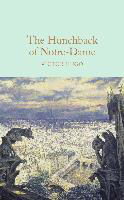An emotionally stirring story, Victor Hugo's The Hunchback of Notre-Dame is rightfully considered to be one of the finest novels ever written.
Part of the Macmillan Collector's Library; a series of stunning, pocket-sized classics bound in real cloth with gold foiled edges and ribbon markers. These beautiful books make perfect gifts or a treat for any book lover. This beautiful edition, featuring an afterword by John Grant, is the perfect way to experience this unforgettable tale.
Rejected by fifteenth-century Parisian society, the bell-ringer Quasimodo believes he is safe under the watchful eye of his master, the Archdeacon Claude Frollo. But after Quasimodo saves the beautiful Romani girl Esmeralda from the gallows and brings her to sanctuary in the cathedral, he and Frollo's mutual desire for her puts them increasingly at odds, before compassion and cruelty clash with tragic results.


